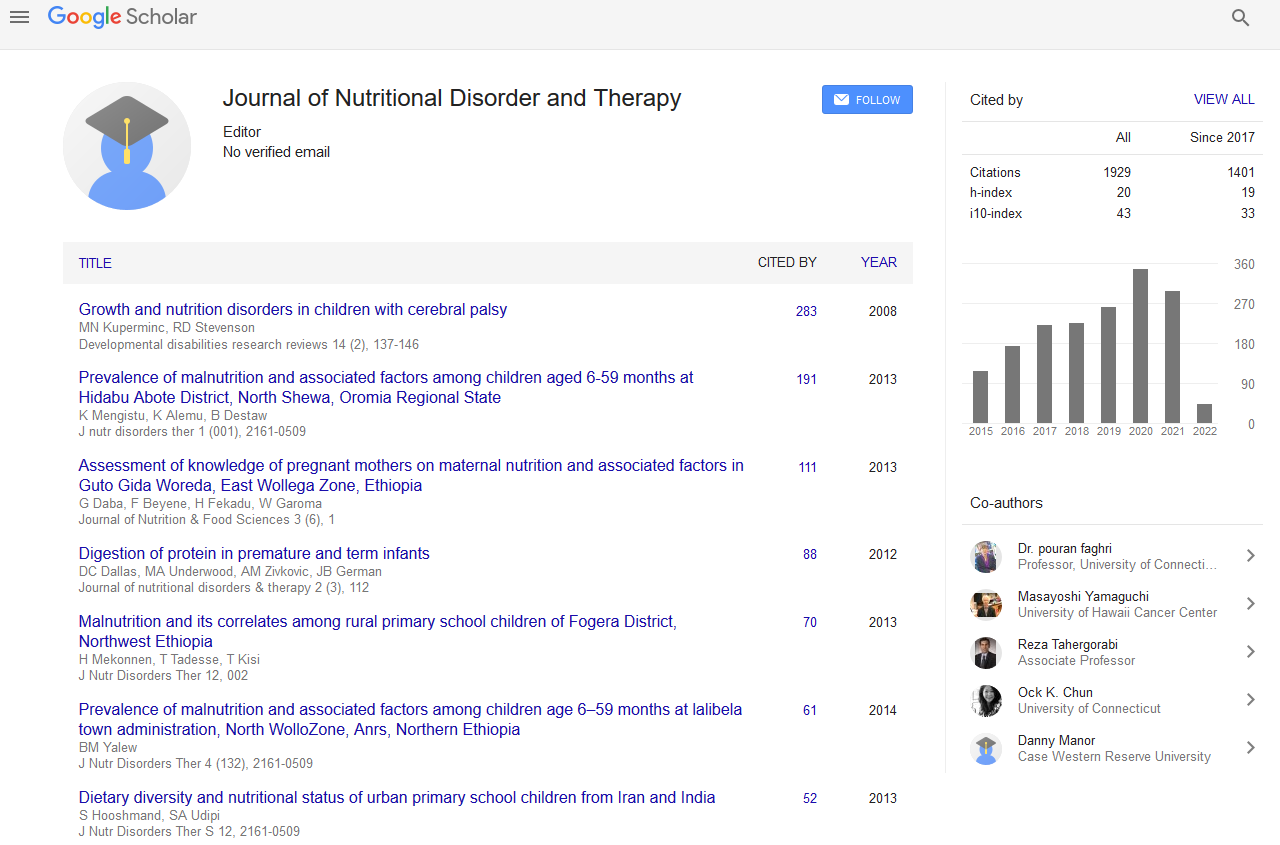Indexed In
- Open J Gate
- Genamics JournalSeek
- Academic Keys
- JournalTOCs
- Ulrich's Periodicals Directory
- RefSeek
- Hamdard University
- EBSCO A-Z
- OCLC- WorldCat
- Publons
- Geneva Foundation for Medical Education and Research
- Euro Pub
Useful Links
Share This Page
Journal Flyer

Open Access Journals
- Agri and Aquaculture
- Biochemistry
- Bioinformatics & Systems Biology
- Business & Management
- Chemistry
- Clinical Sciences
- Engineering
- Food & Nutrition
- General Science
- Genetics & Molecular Biology
- Immunology & Microbiology
- Medical Sciences
- Neuroscience & Psychology
- Nursing & Health Care
- Pharmaceutical Sciences
Abstract
Prevalence of Coronary Heart Diseases Risk Factors in Adults Population Living in Nigeria?s Largest Urban City
Atinuke Titilola Lano-Maduagu, Oguntona CRB, Oguntona EB, Agbonlahor MU and Oluseye O Onabanjo
Coronary Heart Disease (CHD) remains a major cause of morbidity and a leading contributor to mortality worldwide. This study was conducted to determine the prevalence of risk factors of CHD in apparently healthy adult’s population living in Nigeria’s largest urban city. Five hundred subjects were selected using systematic sampling technique. Data were collected using a pre-tested, semi-structured questionnaire to obtain information on sociodemographic characteristics, lifestyle, physical activities and other risk factors. Anthropometric measurements were made using standard procedures, while food intake data was collected using 24-hr dietary recall. Blood samples of the selected healthy subjects were analyzed for haematological indices. Data were analyzed using Pearson Product Moment Correlation to establish relationships among variables. Logit model was used in predicting major risk factors for CHD. The results showed that prevalence of overweight among urban and rural subjects was 37.6% and 26.8%, respectively while 28.4% of urban and 17.2% of rural subjects had waist-hip ratio indicating high risk of heart disease. Sixty-eight percent of urban subjects and 52% of rural had energy intake above 75% Recommended Dietary Allowance (RDA), while 80% urban and 68% rural subjects met above 75% RDA for protein. Total Cholesterol (TC) was above 240 mg/dl in 28% and 20% of urban and rural subjects, respectively. Triglycerides (TG) was >200 mg/dl in 36% of urban and 28% rural healthy subjects. Low density lipoprotein (LDL) (>l60 m g/dl) was similar in 20% of rural and urban subjects. High density lipoprotein (HDL) was <40 mg/dl in 16% and 20% of urban and rural subjects respectively. There was positive relationship between blood pressure and nature of job (r = 0.033, p<0.0l), blood pressure and age (r =0.122; p<0.0l), blood pressure and alcohol consumption (r = 0.021, p<0.05). Logit model used in predicting the probability of developing CHD showed that it is possible to predict to about 49% accuracy the probability of individuals developing CHD. This study has established high blood pressure, tobacco smoking, high lipid profile, physical Inactivity, obesity and diabetes as prevalent risk factors of CHD in healthy adults in Nigeria.


